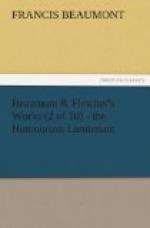Prologue.
Would some man would instruct me what to say For this same Prologue, usual to a Play, Is tied to such an old form of Petition; Men must say nothing now beyond commission: The Cloaks we wear, the Leggs we make, the place We stand in, must be one; and one the face. Nor alter’d nor exceeded; if it be, A general hisse hangs on our levitie: We have a Play, a new Play to play now, And thus low in our Playes behalf we bow; We bow to beg your suffrage, and kind ear; If it were naught, or that it might appear, A thing buoy’d up by prayer, Gentlemen, Believe my faith, you should not see me then. Let them speak then have power to stop a storm: I never lov’d to feel a House so warm: But for the Play if you dare credit me, I think it well: All new things you shall see, And these disposed to all the mirth that may; And short enough we hope: and such a Play
You were wont to like: sit nobly then, and see:
If it miscarry, pray look not for me.
* * * * *
Epilogue,
Spoke by the Lieutenant.
I am not cur’d yet throughly;
for believe
I feel another passion that may grieve,
All over me I feel it too: and now
It takes me cold, cold, cold, I know not
how:
As you are good men help me, a Carowse
May make me love you all, all here i’th’
house,
And all that come to see me doatingly;
Now lend your hands; and for your courtesie,
The next imployment I am sent
upon,
I’le swear you are Physicians,
the War’s none.
THE HUMOUROUS LIEUTENANT.
(A) The First Folio.
(B) The Second Folio.
(C) The Manuscript dated Novemb. 27. 1625.
This MS. is a beautiful specimen of Ralph Crane’s caligraphy. It is bound in vellum, with gilt lines and a gilt design on the cover. The following particulars are written on a leaf before the title-page:—
’K. Digby Margrit This Manuscript belonged to the celebrated Sir Kenelm Digby. His grand-daughter (one of the daughters & co-heiresses of his eldest son, John Digby) was married to Richard Mostyn Esq’re of Penbedw in Denbighshire, & their daughter & coheiress to Richard Williams Esq., my Great Grandfather. Thro’ this connection of my family with that of Digby, several of Sir Kenelm’s books & Manuscripts have come into my possession. Wm W.E. Wynne. given by W.W.E. Wynne Esqre to me W. Ormsby Gore April 8. 1837.’
The title-page is as follows:—
’Demetrius
and
Enanthe,
a pleasant Comedie
written by
John Fletcher gent.’
Surrounding the title are rough decorations drawn in ink in the form of corkscrew scrolls.
The following dedication is written on the leaf following the title-page:—
To the honorable
Sir
Kelham Digbie
Knight.
Worthie Sir.




